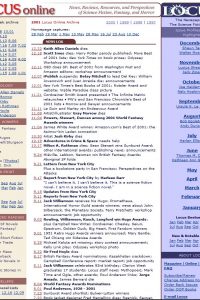Poe and the Fantastic

Photo by Beth Gwinn
Excerpts from the roundtable discussion:
Gary K. Wolfe: We’re talking here with Brian Evenson, Peter Straub, Liza Groen Trombi, and Ellen Datlow about what is more or
less the 200th anniversary of Poe’s birth. Ellen edited the retrospective horror anthology Darkness: Two Decades of Modern Horror (Tachyon, April 2010); Peter has edited a Library of America 200-year retrospective (American Fantastic Tales: Terror and the Uncanny from Poe to the Pulps, and American Fantastic Tales: Terror and the Uncanny from the 1940s to Now, 2009) in which Poe obviously is a central figure, and which includes a story by Brian Evenson, whose most recent novel is Last Days. Ellen has also edited the anthology Poe (Solaris US, 2009), with a group of modern writers revisiting Poe’s themes, not necessarily in obvious ways.
Ellen Datlow: I asked the writers to come to me with a Poe story, poem, or non-fiction piece that would inspire them. They had to take something from an existing Poe work, and I didn’t want too
 many repetitions. Actually, three chose “The Masque of the Red Death” and I knew that they were going to be entirely different from one another and they were. The writers were so good; they weren’t laboriously following the original. Suzy McKee Charnas’s story “Lowland Sea” is “The Masque of the Red Death” but it’s a contemporary plague, an African woman who’s an assistant to movie people who are very decadent, and the whole story takes place in a castle-like fortress, trying to get away from the plague. And that was very different from “Technicolor” by John Langan, which is a brilliant, weird lecture story talking about what Poe meant by
many repetitions. Actually, three chose “The Masque of the Red Death” and I knew that they were going to be entirely different from one another and they were. The writers were so good; they weren’t laboriously following the original. Suzy McKee Charnas’s story “Lowland Sea” is “The Masque of the Red Death” but it’s a contemporary plague, an African woman who’s an assistant to movie people who are very decadent, and the whole story takes place in a castle-like fortress, trying to get away from the plague. And that was very different from “Technicolor” by John Langan, which is a brilliant, weird lecture story talking about what Poe meant by  “The Masque of the Red Death” — the colors, the relationship to Virginia, the wife, and it’s totally twisted. In Glen Hirshberg’s “The Pikesville Buffalo”, Glen created this charming, bittersweet fantasy, about a guy who goes to visit his aging aunts whose husbands died, and it seems that maybe their husbands turned into buffalo. So the writers are all over the place, and I think they did an excellent job. Kristine Kathryn Rusch’s “The Murder of Marie Roget” is a great mystery, nothing supernatural, about a woman who was attacked by someone she knew, and raped, and it’s about how she deals with it. The stories are all over the place. Some of them were by writers who I had no idea were interested in Poe, like Delia Sherman. And she did a lovely story. I didn’t realize it was as funny as it was meant to be until she read it aloud. It’s a parody of fervent, florid women, and is a very effective dark piece. Lucius Shepard did “Kirikh’quru Krokundo”, a “The Domain of Arnheim” story.
“The Masque of the Red Death” — the colors, the relationship to Virginia, the wife, and it’s totally twisted. In Glen Hirshberg’s “The Pikesville Buffalo”, Glen created this charming, bittersweet fantasy, about a guy who goes to visit his aging aunts whose husbands died, and it seems that maybe their husbands turned into buffalo. So the writers are all over the place, and I think they did an excellent job. Kristine Kathryn Rusch’s “The Murder of Marie Roget” is a great mystery, nothing supernatural, about a woman who was attacked by someone she knew, and raped, and it’s about how she deals with it. The stories are all over the place. Some of them were by writers who I had no idea were interested in Poe, like Delia Sherman. And she did a lovely story. I didn’t realize it was as funny as it was meant to be until she read it aloud. It’s a parody of fervent, florid women, and is a very effective dark piece. Lucius Shepard did “Kirikh’quru Krokundo”, a “The Domain of Arnheim” story.
GKW: That would suggest something that I think we could make a theme: these are what I think of as the Hidden Poe. There’s the public Poe: the Roger Corman Poe. But there’s what I’m thinking of as the Hidden Poe: not the iconic stories, not “The Pit and the Pendulum”.
 Brian Evenson: Were there stories that people didn’t key on that you thought they would?
Brian Evenson: Were there stories that people didn’t key on that you thought they would?
ED: I was totally open. M. Rickert did “Annabel Lee”. I didn’t tell them don’t do this one.
Peter Straub: If I had done a story for your book, I would have done “The Fall of the House of Usher” — that’s a really deep story. There’s something weirdly modern about that story: the house, the landscape. It seems to have an immense amount of psychological roominess in a way that most Poe stories do not — it seems weirdly modern, with the aspect of the sister, the relationship of the people to the house they’re in, and the relationship of all that to the surrounding landscape. It seems an immense amount could be done with that, and strikes me as world-class stuff. I wanted to use “The Domain of Arnheim” for my anthology because nothing happens in it! But at the same time, it’s charged with atmosphere. It consists of nothing but a detailed description of a certain landscape, as if seen by someone on a boat going through a crowded bank. I wanted it for the Library of America volume, but the directors didn’t want me to do that because it was such an oddball choice. I liked it because it was an oddball choice: it’s a story that’s largely unknown, and it strikes me that it is suggestive of the way that  Poe extends his influence beyond what is normally seen as his territory. All of this is weirdly premonitory of other things that happened in American writing. Towards something completely suggestive, with nothing explicit at all except this landscape. It might have been an unfinished fragment, but I’m not sure. It struck me as foreboding and very rich.
Poe extends his influence beyond what is normally seen as his territory. All of this is weirdly premonitory of other things that happened in American writing. Towards something completely suggestive, with nothing explicit at all except this landscape. It might have been an unfinished fragment, but I’m not sure. It struck me as foreboding and very rich.
BE: I ask students sometimes to do imitations, and sometimes they do Poe. And it’s always “Mad, am I mad? No!” — that kind of syntax, which is interesting, but there are a lot of other things going on in Poe. I do love “The Fall of the House of Usher”, but I love “The Masque of the Red Death” as well. I find that a very haunting story. And “Hop-Frog” is pretty great.








“it’s a story that’s largely unknown, and it strikes me that it is suggestive of the way that Poe extends his influence beyond what is normally seen as his territory.”
Very true. “Arnheim” is perhaps my favorite Poe story, in part for that reason.
Pingback:Tweets that mention Locus Online Perspectives » Poe and the Fantastic -- Topsy.com